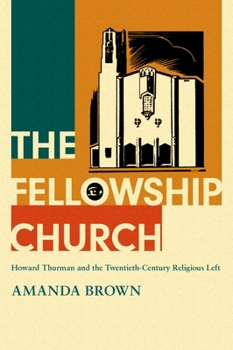The Fellowship Church: Howard Thurman and the Twentieth-Century Religious Left
The Fellowship Church explores the evolution of the American religious left through a case study of the African American intellectual and theologian Howard Thurman, and the physical embodiment of his thought: The Church for the Fellowship of All Peoples. The Fellowship Church, which Thurman co-founded in San Francisco in 1944, was the nation's first interracial, intercultural, and interfaith church. Amidst the growing nationalism of the World War II era and the heightened suspicion of racial and cultural "others," the Fellowship Church successfully established a pluralistic community based on the idea that "if people can come together in worship, over time would emerge a unity that would be stronger than socially imposed barriers." Rooted in the belief that social change was inextricably connected to internal, psychological transformation and the personal realization of the human community, it was an early expression of Christian nonviolent activism within the long Civil Rights Movement. The Fellowship Church was a product of evolving twentieth-century ideas and a reflection of the shifting mid-century American public consciousness. This book examines a broad scope of modern themes including the philosophy of pragmatism; mysticism and Christian liberalism; racism and imperialism; cosmopolitanism and pluralism; war and pacifism; and nonviolence. Not only does it expand on our understanding of twentieth-century American intellectual history and the origins of the Civil Rights Movement, it offers an exciting look into ways people have initiated grassroots activism during times when government has failed to protect its citizens' civil liberties, safety, and overall wellbeing through judicial safeguards.
Format:Hardcover
Language:English
ISBN:0197565131
ISBN13:9780197565131
Release Date:July 2021
Publisher:Oxford University Press
Length:256 Pages
Weight:1.15 lbs.
Dimensions:0.9" x 6.5" x 9.5"
Customer Reviews
0 rating





